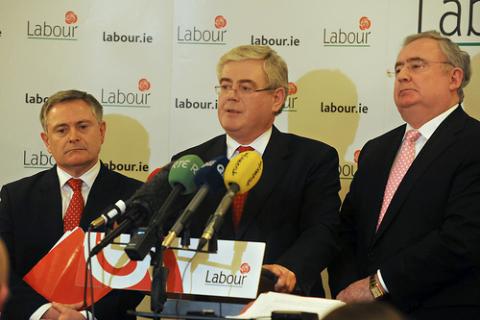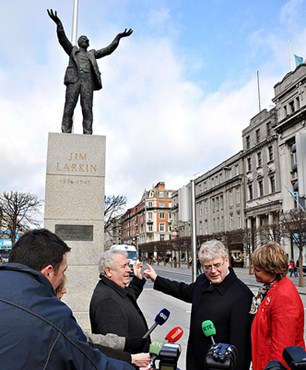Left betrayed by Labour leadership

A meeting of left-wing political parties at the weekend showed that while points of consensus on left unity exist, the obstacles are many. By Alison Spillane
Left-wing parties across the political spectrum gathered at a conference in Dublin on Saturday last (5 February) to discuss policies, political strategies and the prospects for left-wing unity. Organised by CIT economist Tom O'Connor and Deirdre O'Byrne, the conference brought together activists, academics and politicians from a range of left-wing parties as well as trade unions, universities, think tanks and civil society groups.
[Pictured: Labour leader Eamon Gilmore flanked by senior party members Brendan Howlin and Pat Rabbitte.]
The opening session was chaired by Kathleen Lynch, Professor of Equality Studies at UCD, and looked at the future of the Irish Left in terms of policies, political strategies and future possibilities. Among the speakers were Sinn Féin's Aengus O'Snodaigh and Eoin O'Broin, two Labour Party councillors, Joe Higgins and Richard Boyd-Barrett of United Left Alliance (ULA) and the Communist Party's Noel Martin.
Speakers were restrained in their criticism of the Labour Party, which had adopted a centrist position politically and looks set to enter coalition with Fine Gael after the general election. However, Socialist Party leader and MEP Joe Higgins called for left-wing members of Labour to break away from the party. He cited the experiences of Greece, Spain and Portugal, where Labour Party counterparts are implementing "savage" cuts and "destroying" public services "at the behest of the European Union and the markets". This is indicative of the future of the Irish Labour Party, he said.
UCD's Kieran Allen made similar remarks saying there would be no unity between the Left and a Labour Party in government "implementing right-wing IMF policies".
Labour - a betrayal of the Left
In their contributions, however, Labour councillors Cian O'Callaghan and Dermot Looney showed that many on the left of the Labour Party are uncomfortable with the rightward drift of the party since the announcement of the IMF-EU programme. It appears that some differences of opinion exist between the rank and file of the party and its leadership. O'Callaghan said it was imperative that a clear choice should exist between Right and Left in Irish politics. Moreover, he said no left-wing party should enter government unless they could lead that government. However, Mr O'Callaghan also said he believed Labour would vote to form a coalition government with Fine Gael.
In terms of cohesion on the Left, Labour Councillor Dermot Looney spoke about his personal experience as a member of South Dublin County Council – the only left-led council in the country where an alliance exists between members of Labour, Sinn Féin and Independents. Among the achievements of this council was the voluntary move by the governing bloc (along with one Fianna Fail and one People Before Profit councillor) to use expenses allocated for attending conferences (€4,000 per councillor annually) to build a homeless unit in the constituency.
With the exception of South Dublin however, this kind of left-wing alliance is completely unheard of in local government. Indeed, Richard Boyd-Barrett of Dun Laoghaire Rathdown Council said he and fellow People Before Profit councillor Hugh Lewis lay a similar motion before their council that was defeated. On three occasions they proposed that the overall budget for councillors to attend conferences and training seminars be reduced to €26,000 (at present it exceeds €100,000). The motion was defeated each time with members of the Labour Party siding with Fine Gael and Fianna Fáil on the issue.
 The Labour Party has divided those on the Left. Many feel it has betrayed the Left in its pursuit of centrist policies in an effort to placate the masses, including those disillusioned with Fianna Fáil and uncertain about the prospect of Enda Kenny as Taoiseach.
The Labour Party has divided those on the Left. Many feel it has betrayed the Left in its pursuit of centrist policies in an effort to placate the masses, including those disillusioned with Fianna Fáil and uncertain about the prospect of Enda Kenny as Taoiseach.
In this respect Labour may have stretched itself too thinly across the political spectrum, falling back to its traditional electoral strategy of "pleasing none of the people all of the time". Some may argue that it underestimated the level of support on the Left; opinion polls have shown a clear shift in voting intentions in recent times with the two conservative parties on a combined score of less than 50% in some polls. In some cases, the combined score of Sinn Féin and Labour rivalled that of Fine Gael and Fianna Fáil, and that is before the percentage for Others/Independents is added, which would involve a significant left-wing vote for members of People Before Profit, the Socialist Party and others, running in this election under the banner of the United Left Alliance (ULA).
[Pictured: Eamon Gilmore at the statue of Jim Larkin on O'Connell Street.]
Forum to build left unity
In an excellent contribution from the floor, Labour activist Helena Sheehan called for the establishment of a left forum to allow for more debate and discussion over the question of Left unity – the idea was greeted with enthusiasm by attendees.
Sinn Féin's Eoin O'Broin spoke about the failures of the Left saying that it creates many of the obstacles it is faced with, particularly in terms of gaining popular support. He said the Left has failed to articulate itself clearly and, as a result, much of the electorate do not believe it has coherent and feasible alternatives to the policies of Fine Gael and Fianna Fáil.
O'Broin gave a clear and thought-provoking analysis of some of the problems faced by the Left. He outlined three distinct strands which he believes make up the Irish Left: the revolutionary Marxist tradition; the social democratic Left; and the Republican Left. He said historically, difficulties arose on the Left because of the way each of these factions viewed the process of achieving change – the revolutionary Marxists focus on popular mobilisation, the social democrats reform through acts of parliament, and the Republican Left oscillates between the two.
As well as this he spoke about civil society organisations and social movements saying that left-wing parties often talk about the mobilisation of these groups on the basis of what they can gain from such a move, instead of having an attitude of mutual benefit.
Mr O'Broin said that although there was a danger of fratricide and incoherence on the Left, things had improved in recent times; he highlighted the influence of think tanks such as Tasc, and the fact that in recent opinion polls as well as the last local and European elections the combined Left have broken the 40% barrier in voting share.
One of the most moving contributions of the day came from 92-year-old Desmond Brannigan, a former Ictu advisor and former marine researcher who spoke about Ireland's natural resources. Mr Brannigan told the conference the country's financial problems could be resolved if the oil and gas offshore – with an estimated value of €420 billion – was taken into public ownership. However, he was not optimistic that this would happen, telling the audience "you are the products of a system which has deliberately misrepresented the things you should know".
The Communist Party's Noel Martin told the conference there had never been a greater need for Left unity. He appealed to the trade union movement to organise but also said it shouldn't be criticised by those on the outside. Mr Martin advocated a repudiation of the debt, arguing that both renegotiation of the 'recue package' and defaulting on the debt accepted that it was the fault or responsibility of the Irish people.
Room for consensus
Michael Taft, economic advisor to Unite, opened the last session of the day which focused on 'New Left Policies for Economic, Social and Political Regeneration'. Taft told the conference that although many areas of contention exist among those on the Left, there was also a lot of space for consensus.
Drawing on the policy documents and proposals put forward by organisations such as Tasc, the Irish National Organisation for the Unemployed (INOU), Ictu, Claiming Our Future and the Community Platform, Mr Taft said commonalities existed in that all said investment was crucial to bringing about fiscal stability and that proposals for increased taxation came from an economically sound perspective rather than a desire to "gut the rich". He also said that all three strands of the Left agree that it is imperative to end austerity measures, particularly in the form of welfare and benefit cuts.
Towards the end of the day UCD's Kathleen Lynch gave an excellent and impassioned speech about emigration. She said that as well as the economic effects of emigration there was a deep emotional cost with many older people feeling robbed of their children and grandchildren.
Overall, the tone of the day was positive and upbeat with many interesting observations coming from both the panellists and the audience. If any criticism were to be given, it would be the clear gender imbalance on the panels (although Prof Lynch drew attention to this and encouraged contributions from women in the audience). There was a general consensus among those present that despite the differences between the various factions it was important people vote Left as much as possible in the upcoming election, with some members of the audience calling for a transfer pact between the left-wing parties in order to maximise the Left vote, an approach advocated by Sinn Fein's Aengus O'Snodaigh.
On Sunday night, Richard Boyd-Barrett debated the issue of Left unity and the IMF-EU bailout with Labour's Pat Rabbitte on RTE's The Week In Politics. See here (25 minutes in).
